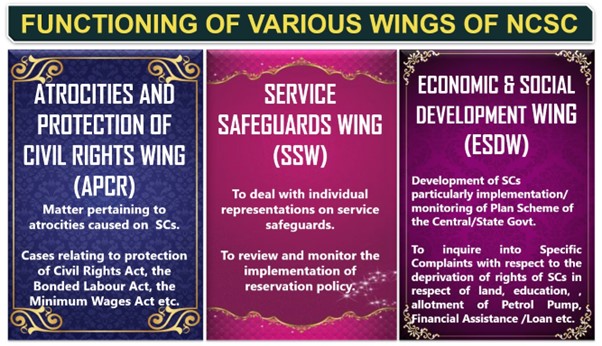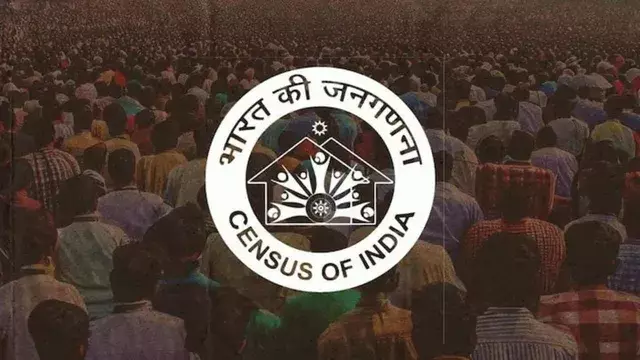- Courses
- GS Full Course 1 Year
- GS Full Course 2 Year
- GS Full Course 3 Year
- GS Full Course Till Selection
- Answer Alpha: Mains 2025 Mentorship
- MEP (Mains Enrichment Programme) Data, Facts
- Essay Target – 150+ Marks
- Online Program
- GS Recorded Course
- Polity
- Geography
- Economy
- Ancient, Medieval and Art & Culture AMAC
- Modern India, Post Independence & World History
- Environment
- Governance
- Science & Technology
- International Relations and Internal Security
- Disaster Management
- Ethics
- NCERT Current Affairs
- Indian Society and Social Issue
- NCERT- Science and Technology
- NCERT - Geography
- NCERT - Ancient History
- NCERT- World History
- NCERT Modern History
- CSAT
- 5 LAYERED ARJUNA Mentorship
- Public Administration Optional
- ABOUT US
- OUR TOPPERS
- TEST SERIES
- FREE STUDY MATERIAL
- VIDEOS
- CONTACT US
National Commission for Scheduled Caste
National Commission for Scheduled Caste


Latest Context
A notice to Zomato issued by the National Commission for Scheduled Castes (NCSC) has recently been issued, regarding an advertisement that was deemed "inhuman" and casteist.
National Commission for Scheduled Castes
Introduction: It is a constitutional body to provide safeguards against the exploitation of Scheduled Castes in addition to promoting and protecting their social, educational, economic and cultural interests.
Background History
- Special Officer: Initially, under Article 338, the constitution provided for the appointment of a Special Officer. He was designated as the Commissioner for Scheduled Castes and Scheduled Tribes.
- 65th Amendment Act, 1990: It brought about an amendment in Article 338 of the Constitution and substituted the one-member system with a multi-member National Commission for Scheduled Castes (SC) and Scheduled Tribes (ST).
- 89th Amendment Act, 2003: In the year 2003, Article 338 was amended, and the old National Commission for SC and ST was replaced by two separate Commissions from the year 2004 which were:
- National Commission for Scheduled Castes (NCSC) and
- National Commission for Scheduled Tribes (NCST)
Composition:
- It comprises a chairperson and consists of a Vice-Chairperson and three additional Members.
- President appoints the member of this commission, indicated by a warrant under his hand and seal.
- President determines their conditions of service and tenure of office.
Functions:
- Regarding the constitutional and other legal safeguards for the SCs and to evaluate their work, to monitor and investigate all matters
- With respect to the deprivation of rights and safeguards of the SCs, conducting the inquiry into specific complaints
- To advise and participate in the planning process of the socio-economic development of the SCs and to evaluate the progress of their development under the Union or a state;
- To present annually and at such other times as it may deem fit, reports upon the working of those safeguards to the President.
- To recommend the required measures that must be taken by the Union or a State for effective implementation of those safeguards for the protection, welfare and socio-economic development of the SCs
- It was authorized to perform similar functions with regard to the other backward classes (OBCs) till 2018. By the 102nd Amendment Act, of 2018, it was relieved from this responsibility.
Key Constitutional Provisions for Upliftment of the Schedule Caste
- Article 15: It lays emphasis on resolving the issues of discrimination based on caste, emphasizing the protection and upliftment of Scheduled Castes (SCs)
- Article 17: It abolishes untouchability and prohibits its practice in any form. It seeks to eliminate social discrimination and promote the equality and dignity of all individuals.
- Article 46: It instructs the State to promote the educational and economic interests of Scheduled Castes and other weaker sections of society and safeguard them from social injustice and all forms of exploitation.
- Article 243D (4): It makes the provision for the reservation of seats for SCs in Panchayats (local self-government institutions) in proportion to their population in the area.
- Article 243T (4): It secures the reservation of seats for SCs in Municipalities (urban local bodies) in proportion to their population in the area.
- Article 330 &Article 332: It provides for the reservation of seats in favour of the Scheduled Castes and the Scheduled Tribes in the Lok Sabha and in the legislative assemblies of the States (respectively).

Mains
Q. In 2001, RGI stated that Dalits who converted to Islam or Christianity are not a single ethnic group as they belong to different caste groups. Therefore, they cannot be included in the list of Scheduled Castes (SC) as per Clause (2) of Article 341, which requires a single ethnic group for inclusion. (2014)
Q. Whether the National Commission for Scheduled Castes (NCSC) can enforce the implementation of constitutional reservation for the Scheduled Castes in the religious minority institutions? Examine. (2018)



